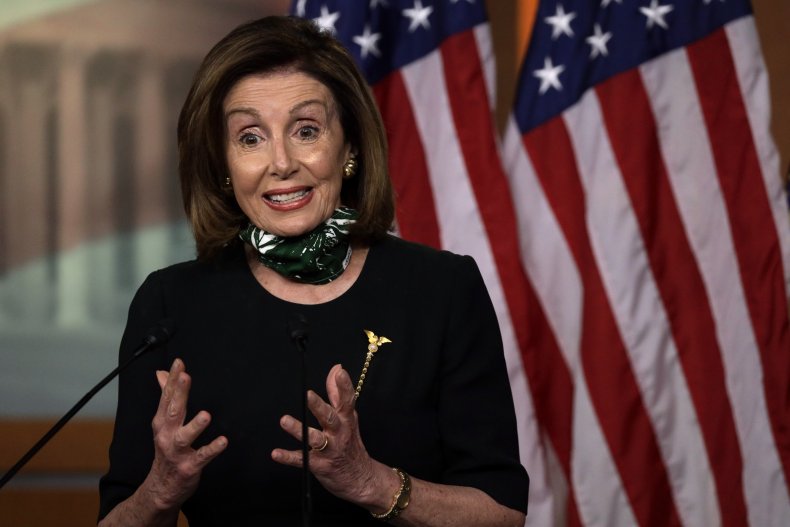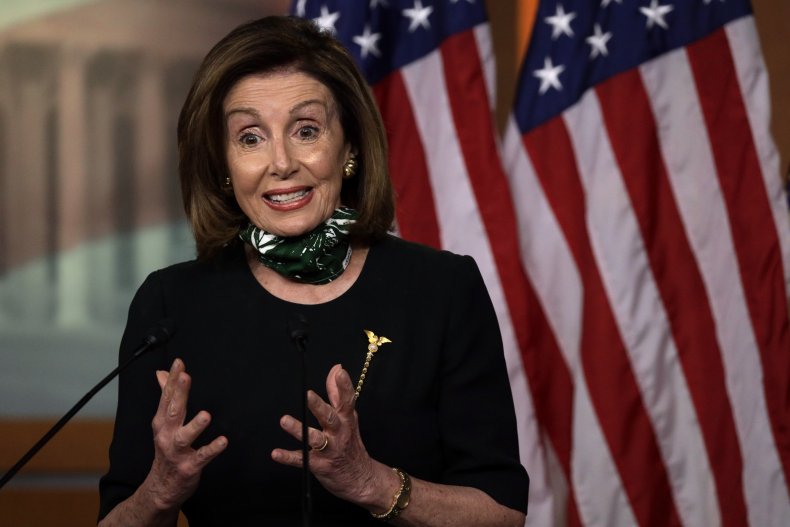Speaker Nancy Pelosi muscled a $3 trillion aid package through the House late Friday, overcoming defections from her party’s moderate wing who would have preferred to vote for a bipartisan measure.

The near party-line tally was 208-199, with 14 Democrats voting against sending the bill to the Senate. Rep. Peter T. King, R-N.Y., was the lone Republican to support the measure, citing robust aid for states and localities like his suffering from revenue shortfalls and high numbers of COVID-19 cases.
Among the Democrats who announced in advance they’d vote against the package were Cindy Axne of Iowa, Joe Cunningham of South Carolina, Kendra Horn of Oklahoma, Ben McAdams of Utah and Abigail Spanberger of Virginia. All are moderates in GOP-leaning districts.
“I think it’s something that should have had more broad bipartisan support,” said Cunningham. He argued that aid legislation “needs to be more narrowly focused on the people who are suffering as a result of the pandemic.”
Cunningham won his seat in 2018 in a major upset; he’s considered a top GOP target in November in a district that backed President Donald Trump in 2016 by nearly 11 points. Inside Elections with Nathan L. Gonzales rates the contest a Toss-up.
Congressional Progressive Caucus co-chairwoman Pramila Jayapal, D-Wash., was the sole member of the party’s more liberal wing to vote against the bill. She told reporters the measure didn’t go far enough to help workers and businesses.
“At the end of the day, what I’m talking about is protecting the economy and protecting people from dying, because businesses and workers feel too much pressure to go back to work too quickly because they don’t have money,” said Jayapal.
Jayapal said she wished the legislation included the paycheck guarantee proposal she released in early April that would have ensured workers receive 100 percent of their salaries up to $100,000 and provided businesses with funding to cover “essential” expenses such as rent.
Democratic Rep. Katie Porter, who represents a moderate district in Orange County, Calif., voted against the rule that cleared the way for debate but later announced on the floor she’d vote for the bill.
“I know our states and local governments and our frontline workers cannot wait for federal help,” she said. “I therefore support this bill.”
The bill includes dozens of key Democratic priorities and has elicited sharp criticism from Senate Majority Leader Mitch McConnell, who on Thursday called the 1,815-page package a “liberal wish list.” The White House issued a veto threat on the measure.
The bill includes nearly $1 trillion in aid to local and state governments, which are facing steep budget shortfalls following a drop off in income tax revenue due to skyrocketing unemployment, as well as a reduction in sales tax revenue after businesses mostly shut down due to stay-at-home orders.
The bill would provide $435 billion, according to the Joint Committee on Taxation, to send out more direct payments to households and fill in gaps from the previous round, estimated in March to cost $293 billion.
Families with adult children who are full-time students up to age 24 could now receive $500 from the previous round, which had cut off at age 17; the age limit would be raised for the new round as well, and up to three children per household would be eligible for the full $1,200 amount allotted to adults.
Immigration debate
It would also make individuals with a taxpayer identification number eligible for payments, even if they don’t have a Social Security number. Critics said that would open the door to undocumented immigrants getting payments, and Republicans were nearly successful on a procedural vote to strip that provision.
The House rejected the motion to recommit on a 198-209 vote, despite 13 Democrats crossing the aisle to support it. Rep. Justin Amash, I-Mich., voted against the motion.
Pelosi and other Democratic leaders worked hard during the vote to persuade party moderates in tough races to oppose the GOP motion.
The legislation would also establish a nearly $200 billion grant program for employers to provide a pay increase for “essential workers,” such as first responders and employees at hospitals, grocery stores and meat processing plants.
And expanded unemployment insurance benefits worth an extra $600 per week on top of regular state allotments would be extended from August through the end of January, and through March if regular state eligibility hadn’t been used up yet.
Many Republicans oppose the higher weekly benefit because in many states it would pay unemployed workers more than they made before they were laid off, which they say will cripple firms’ ability to reopen once lockdowns are lifted.

